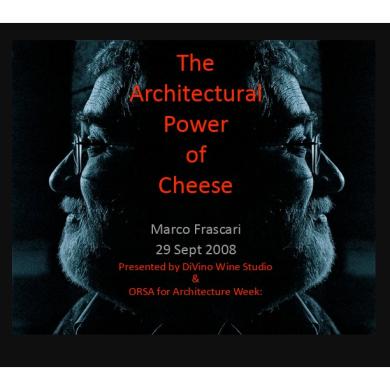Weak Sustainability
This document was uploaded by user and they confirmed that they have the permission to share it. If you are author or own the copyright of this book, please report to us by using this DMCA report form. Report DMCA
Overview
Download & View Weak Sustainability as PDF for free.
More details
- Words: 423
- Pages:
Weak sustainability
1
A few thoughts about sustainability By Marco Frascari Wednesday, January 14, 2009 The question of sustainability is related to value. Unfortunately there are too many kinds of value on the market: historic values, cost values –traditionally considered unnecessary in schools since there is the bizarre belief that designing within a budget hampers architectural creativity– intrinsic values, instrumental values and the most important of the values: ethical values. Traditional utilitarianism is the negation of sustainability, but most of the present thinking on sustainability is developed within the tenets of utilitarianism, where morality is about producing good consequences but not having good intentions, and architectural sustainability becomes a way of producing the greatest overall amount of good in the world. The emphasis is clearly on consequences, not intentions. Utilitarianism often demands that we put aside our own moral convictions. A good model to tackle the question of sustainability is the one worked out by Igiazi Sola-Morales—the idea of Weak Architecture--and schools should work out the opposition: Strong Sustainability versus Weak Sustainability. Our Western culture aspires to power and domination and this pursuit describes architecture as well architectural sustainability, and consequently the preponderance of architects seeks to produce buildings with a powerful image and impact (i.e. Starchitects for sustainability!). Referring to a way of philosophizing that does not aspire to totalize the multitude of human discourses into a single system, the Italian philosopher Gianni Vattimo introduced the notions of Weak Ontology. In accordance with Vattimoʼs notions, Solas-Morales speaks of a weak architecture, and we should speak of a weak sustainability. The idea of weak sustainability in architecture should be related to the concept of weak force, a force that governs decay as well as the weak processes of nature, whereas strong sustainability uses excessive physical aggression in its technological processes. The concept of weak sustainability in architecture should deal with the nature of hybrid technologies. Hybrid technologies are various, polymorphous (solar, wind, water), compounded (adaptive reuse) and multifaceted (architecture of spoils) in which it is acceptable to cut sectional courses that run not only from top to substructure, from start to end, but also, crosswise, obliquely and transversely. The appropriate way to tackle this concept of week sustainable architecture and greening the curricula is to teach a course of architectural ethics based on real or oblique crossing of poetics and pathos in a cosmopoiesis, i.e. the ethics of worldmaking that give rise to the synesthetic and haptic townscapes of intimacy and participation as in the weak urbanism proposed by Simon Hubacker in 1999.
1
A few thoughts about sustainability By Marco Frascari Wednesday, January 14, 2009 The question of sustainability is related to value. Unfortunately there are too many kinds of value on the market: historic values, cost values –traditionally considered unnecessary in schools since there is the bizarre belief that designing within a budget hampers architectural creativity– intrinsic values, instrumental values and the most important of the values: ethical values. Traditional utilitarianism is the negation of sustainability, but most of the present thinking on sustainability is developed within the tenets of utilitarianism, where morality is about producing good consequences but not having good intentions, and architectural sustainability becomes a way of producing the greatest overall amount of good in the world. The emphasis is clearly on consequences, not intentions. Utilitarianism often demands that we put aside our own moral convictions. A good model to tackle the question of sustainability is the one worked out by Igiazi Sola-Morales—the idea of Weak Architecture--and schools should work out the opposition: Strong Sustainability versus Weak Sustainability. Our Western culture aspires to power and domination and this pursuit describes architecture as well architectural sustainability, and consequently the preponderance of architects seeks to produce buildings with a powerful image and impact (i.e. Starchitects for sustainability!). Referring to a way of philosophizing that does not aspire to totalize the multitude of human discourses into a single system, the Italian philosopher Gianni Vattimo introduced the notions of Weak Ontology. In accordance with Vattimoʼs notions, Solas-Morales speaks of a weak architecture, and we should speak of a weak sustainability. The idea of weak sustainability in architecture should be related to the concept of weak force, a force that governs decay as well as the weak processes of nature, whereas strong sustainability uses excessive physical aggression in its technological processes. The concept of weak sustainability in architecture should deal with the nature of hybrid technologies. Hybrid technologies are various, polymorphous (solar, wind, water), compounded (adaptive reuse) and multifaceted (architecture of spoils) in which it is acceptable to cut sectional courses that run not only from top to substructure, from start to end, but also, crosswise, obliquely and transversely. The appropriate way to tackle this concept of week sustainable architecture and greening the curricula is to teach a course of architectural ethics based on real or oblique crossing of poetics and pathos in a cosmopoiesis, i.e. the ethics of worldmaking that give rise to the synesthetic and haptic townscapes of intimacy and participation as in the weak urbanism proposed by Simon Hubacker in 1999.
Related Documents

Weak Sustainability
December 2019 38
Weak Sustainability
June 2020 4
Sustainability
May 2020 33
Weak Entity
December 2019 40
Verbs - Weak
April 2020 23
Weak Interaction
October 2019 28More Documents from "Vincent S Ryan"

Weak Sustainability
December 2019 38
The Architectural Power Of Cheese
October 2019 25
Tecnorama Angelic View
November 2019 23
Marco Frascari Theory Drawing
November 2019 19
Neurourbanism1
December 2019 21